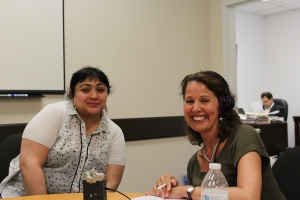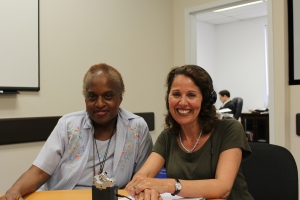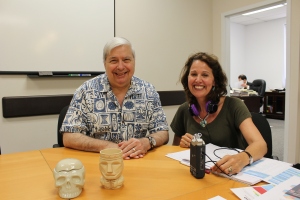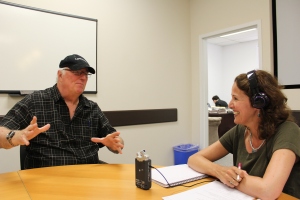Happy National Poetry Day, one and all. Just thought I’d look back over some of my work accomplished with the encouragement of Harpenden Writers over the years.
I’m a lover of words and syntax but I also like rhythm and musicality, so here’s a ballad I once wrote. It is inspired by my Shropshire family history – you’ll need to imagine the tune though, as I’m yet to make a recording of it. This piece won me an award in one of our HW annual writing competitions.
The Ballad of Dorothy Thomas
Part One
1.
On the Eve of New Year nineteen hundred and seven,
A babe was conceived out of wedlock and passion.
She was born that September but spared the disgrace
Of a workhouse deliv’ry, for an uncle bought space
In a nursing home private and clean, and clean, in a nursing home, private and clean.
2.
From Manchester to Myddle in Shropshire she came;
A bundle of love for her grand-folk to claim.
She was named Dorothy and they never did learn
Just who was her father. Who could it have been
That had sired her by courting her mum, her mum? Who had sired her by courting her mum?
3.
But young Dorothy had a warm loving home.
Her grandparents raised her as one of their own,
And her future looked bright, for Britain took pride
In social improvements, on Liberal’s side.
Thanks in part to Edward the King, the King, thanks in part to Edward the King.
4.
Before she’d turned five, Dot’s birth mother died,
Of TB in the city where she did reside.
Though everyone mourned, no message was left
For their daughter’s new family so sadly bereft,
For the brother that Dot never met, never met, the brother that Dot never met.
5.
She grew and she flourished throughout the Great War.
Life was safe for those working in agriculture.
By the time that War ended, young Dot was eleven.
Her dad took a job as gamekeeper at Petton.
So they moved to a farm at Stonehill, Stonehill, they moved to a farm at Stonehill.
6.
Young Dorothy went to the Cockshutt Church School,
Her best friend was Nell. They worked hard, as a rule.
Dot left at fourteen, with a glowing report,
And to work at the Vic’rage, as nanny, was sought.
Her charm and good nature shone forth, shone forth, her charm and good nature shone forth.
7.
Not one to miss out on a dance or a jig
Fair Dot could enchant all the lads at a gig.
She grew, oh so tall, that lace linings she’d sew
And frills and fur edging on skirts she’d borrow.
The Belle of the Ball she’d be, she’d be, the Belle of the Ball she’d be.
8.
One night she met Harry who had two left feet.
He’d been in the army but now he sold meat.
She thought he was handsome and fell for his charms
And was totally smitten when held in his arms.
She wished he would walk her home, her home, she wished he would walk her home.
9.
On September the 4th, they were married at Petton,
In the year of our lord 1930 and one.
Fair Dot she was stunning in white satin gown
With bouquet of cream roses fresh picked on the morn.
And Harry looked grand in his suit, his suit, and Harry looked grand in his suit.
10.
The newlyweds moved to the house at Stonehill,
To care for her parents, both aged and ill.
Soon Harry took over as Gamekeeper proudly
And Dot became postmistress, gossiping loudly.
They took it all on with a smile, a smile, they took it all on with a smile.
11.
A Honeymoon baby arrived in the June –
A strong little girl. They continued to swoon
Then were blessed with two more, first a boy then a girl.
And though the Depression had them all in a whirl,
Their small holding kept them well-fed, well-fed, their small holding kept them well fed.
12.
As Myrtle, “Our Tony” and little Pat grew
The Second World War around them all blew.
Dot took in some strangers, some poor refugees
From Manchester, Liverpool; threatened cities.
She made them all feel quite at home, at home, she made them all feel quite at home.
13.
Despite the intrusion, Dot soon was with child.
Surprising to her, for she felt far too old.
But Susan was born in the June and she won
All the hearts in Stonehill and the village beyond.
A fourth child for Dot to dote on, dote on, a fourth child for Dot to dote on.
14.
Dot’s health was not good, and her lungs had been weakening,
So the children all helped round the house and the holding.
They cleaned out the cows and the chickens and pigs
They pumped their own water and collected twigs
For the Aga that always glowed warm, glowed warm, the Aga that always glowed warm.
15.
They churned their own butter and made their own cheese,
From the milk their Dad Harry had left from the Fries’ian.
They made their own beds and they helped with the meals
Did washing and housework to grant Dot’s appeals.
Their home was kept tidy and clean, and clean, their home was kept tidy and clean.
16.
Dot’s children grew up and pursued their own lives
But rallied around her when poor Harry died.
She’d been widowed by cancer, and would have to believe
That, for her own good, she would now have to leave
The home she’d so loved at Stonehill, Stonehill, the home she’d so loved at Stonehill.
Ref: Coleman, Josephine. ‘The Ballad of Dorothy Thomas’ in The Works. Harpenden Writers 10th Anniversary Collection. Harpenden, Herts.: Nason Publishing, 2007: pp.16-19

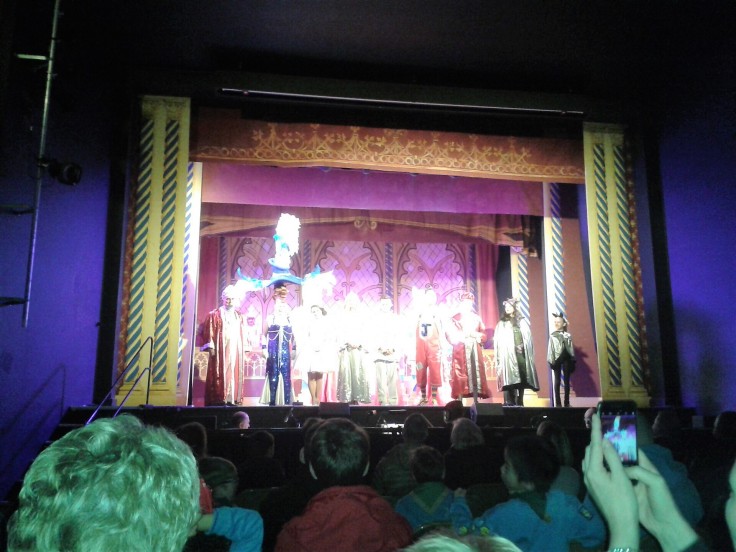

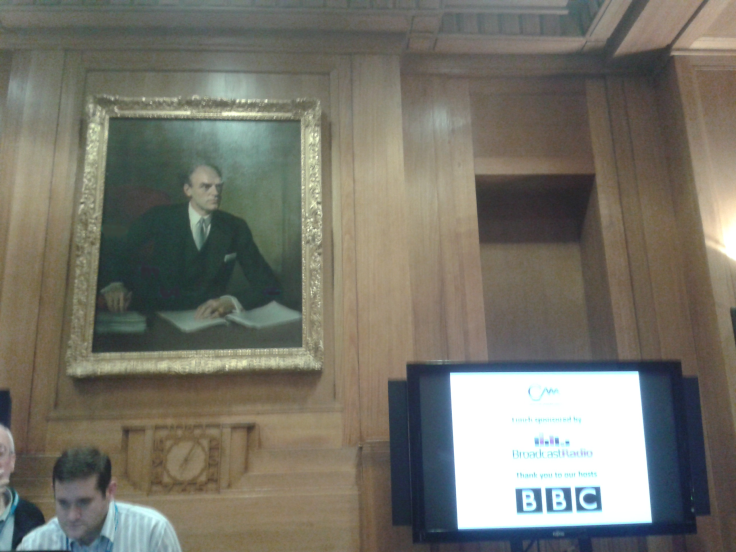

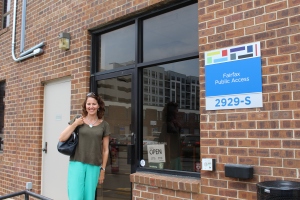
 d so much recently about economic sustainability being such a widespread issue in the community media sector. FPA is funded by the cable companies that have the FCC-granted monopoly to provide local residents and businesses in that area with cable television and internet access. In the two decades since I was last at the station, the area around it has been substantially re-developed and it occupies what is now a very valuable piece of real estate with ample parking, adjacent to a splendid new shopping and leisure complex. The premises are spacious and well laid-out with reception areas, meeting rooms, training suites and editing bays, radio and television studios and numerous offices. It was a Thursday afternoon in August, and I spotted only about a dozen people working at desks and screens.
d so much recently about economic sustainability being such a widespread issue in the community media sector. FPA is funded by the cable companies that have the FCC-granted monopoly to provide local residents and businesses in that area with cable television and internet access. In the two decades since I was last at the station, the area around it has been substantially re-developed and it occupies what is now a very valuable piece of real estate with ample parking, adjacent to a splendid new shopping and leisure complex. The premises are spacious and well laid-out with reception areas, meeting rooms, training suites and editing bays, radio and television studios and numerous offices. It was a Thursday afternoon in August, and I spotted only about a dozen people working at desks and screens.
